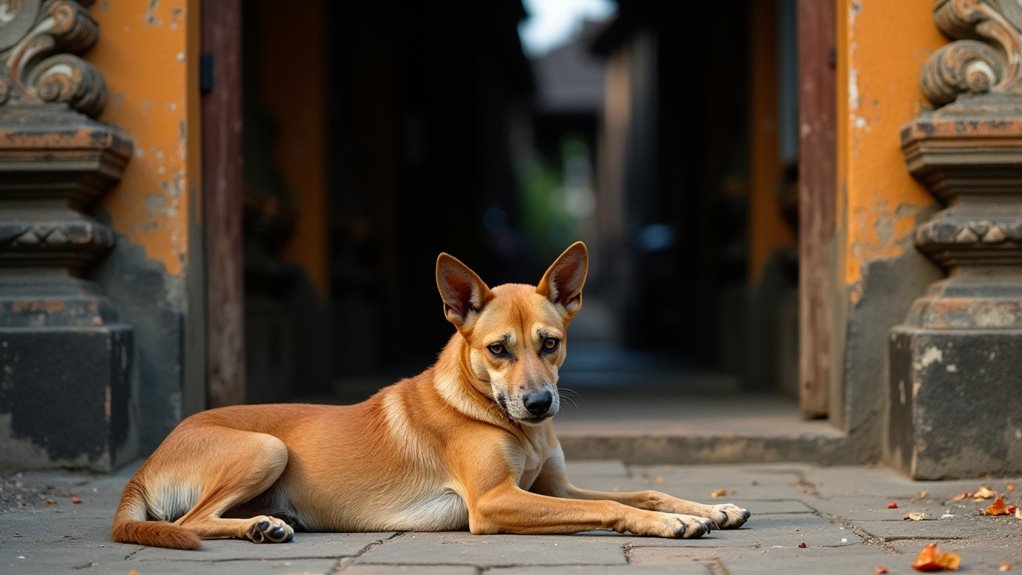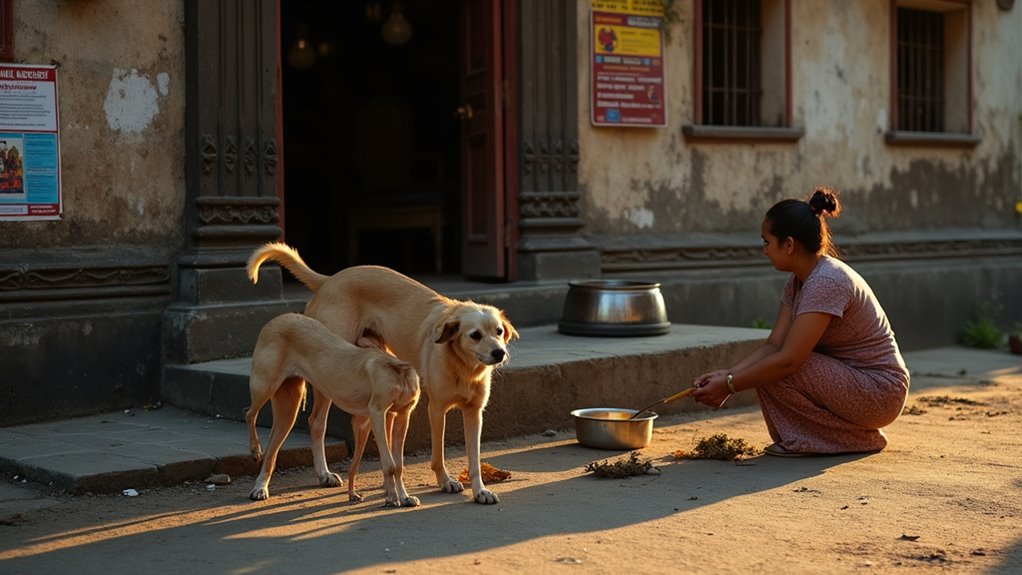Physical Address
304 North Cardinal St.
Dorchester Center, MA 02124
Physical Address
304 North Cardinal St.
Dorchester Center, MA 02124

Fearless when navigating Bali's stray dog population begins with essential knowledge that might save your island adventure.
Did you know that Bali’s streets are home to nearly 500,000 stray dogs? As you explore this Indonesian paradise, you’ll inevitably encounter these free-roaming canines lounging by temples or trotting through villages. While they’ve become part of Bali’s cultural landscape, these strays present real health concerns including rabies transmission and occasional aggressive behavior. Understanding how to safely navigate these encounters isn’t just about your protection—it’s about contributing to sustainable solutions for an issue that affects locals and visitors alike.

While many travelers flock to Bali for its pristine beaches and spiritual retreats, they often overlook one of the island’s most ancient living treasures—the indigenous Bali dog.
These remarkable canines trace their DNA back 12,000 years, making them one of the world’s oldest breeds. You’ll spot them lounging at temple steps or patrolling village perimeters, embodying the Balinese philosophy of harmony between humans, animals, and environment. Unlike the luxurious resorts of Nusa Dua, these dogs represent Bali’s authentic cultural heritage.
Indigenous Bali dogs carry ancient genetic wisdom, serving as silent guardians of sacred spaces and living symbols of Balinese harmony.
Despite their sacred status as spiritual protectors, Bali dogs face mounting threats. Crossbreeding with foreign dogs dilutes their ancient genetics, while urbanization shrinks their traditional habitats. They’re often stigmatized as mere “strays” despite their intelligence, loyalty, and adaptability. Genetic studies have confirmed that these dogs are closely related to the Australian dingo and New Guinea singing dog.
Conservation efforts include vaccination programs and adoption advocacy, aiming to preserve this living cultural heritage before it’s too late.
Despite Bali’s enchanting landscapes, the island faces a sobering stray dog crisis with nearly 500,000 dogs roaming freely across its communities. This number has fluctuated over the years, dropping from earlier estimates of 600,000-800,000.
Several factors fuel this crisis: cultural views of dogs as semi-wild animals, limited resources for animal control, lack of widespread spaying programs, and the abolishment of legislation that once protected indigenous breeds. The Bali street dogs have become a common sight for both locals and travelers visiting this popular destination.
Currently, about 30% of Bali’s dog population remains unvaccinated despite ongoing efforts. The rise to 158 rabies-affected villages by mid-2022 has intensified the urgency of addressing this public health concern.
Local and international organizations run sterilization programs and vaccination campaigns, aiming to make Bali rabies-free by 2030.
You’ll notice both the challenge and opportunity: while the crisis persists, coordinated efforts between communities and organizations are gradually making progress.

The stray dog crisis in Bali extends beyond population numbers, creating serious health concerns that affect daily life across the island. Rabies remains the most serious threat, with over 100 deaths recorded since 2008 and approximately 300 dog bites treated daily at Sanglah Hospital alone.
You’ll find that rabies transmission is a real danger—once symptoms appear, it’s typically fatal. A recent case involved a man who died six months after being bitten because he didn’t receive post-exposure vaccination. This 35-year-old victim from Sukasada, Bali showed typical rabies symptoms including restlessness and high fever just days before his death.
While vaccines are technically free, administrative fees create barriers for many locals who can’t afford treatment. This economic burden, combined with cultural beliefs about dogs in Balinese Hindu tradition, complicates public health efforts and creates ongoing psychological stress for residents living with the daily threat of dog attacks. Visitors concerned about these issues might consider taking a break at one of the island’s burger joints which often donate portions of their proceeds to local animal welfare organizations.
Bali’s current approach to managing its stray dog population involves a complex mix of controversial and progressive strategies. While the government has been criticized for culling and strict relocation measures, several humane alternatives are gaining traction across the island.
Local organizations are leading the charge with:
You’ll find various animal shelters providing care for strays, though economic constraints limit their reach. The government’s recent plan to capture and euthanize stray dogs has sparked significant controversy and opposition from animal welfare advocates. For travelers concerned about encounters with stray dogs, maintaining proper etiquette around these animals is essential for both your safety and their wellbeing.
International partnerships with organizations like World Animal Protection have brought valuable expertise to the island. Despite cultural views of dogs as semi-wild community animals, efforts continue to preserve the indigenous Bali dog breed while implementing more effective population management techniques.

When visiting Bali, you’ll inevitably encounter stray dogs throughout the island, and your actions can profoundly impact their welfare. Consider supporting local vaccination and sterilization programs by donating to NGOs or volunteering during free vaccination drives.
Protect yourself by getting pre-exposure rabies vaccination before traveling. If bitten, immediately clean the wound with soap and water for 15 minutes and seek post-exposure treatment—rabies is 100% fatal once symptoms appear.
Choose accommodations with humane stray dog policies and report cruelty to BAWA or local authorities. Avoid feeding strays human food, which disrupts local ecosystems. Remember that most street dogs in Bali aren’t completely homeless, with nearly 90% having some form of home or caretaker.
For extended stays, consider fostering injured puppies through registered shelters or transporting critical medical supplies.
Share verified information about high-risk rabies zones with fellow travelers.
If you’re looking for a break from the mainland, Nusa Lembongan Island offers a charming getaway with fewer stray dog populations to worry about during your Bali adventure.
You’ve now got the full picture of Bali’s stray dog situation—a tangled web that affects locals and visitors alike. By staying informed, avoiding feeding strays, and supporting local initiatives, you’ll help address this challenge without breaking the bank. Remember, even small actions contribute meaningfully to both your safety and the welfare of these animals. Your responsible choices today create a healthier Bali for tomorrow.